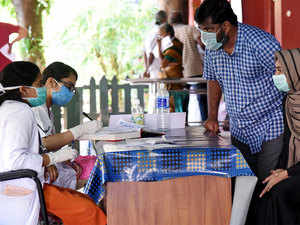 ANI
ANIThe report estimates a loss of about Rs 80,000 crore in gross value added (GVA) to the Kerala economy in Q1 (Apr-Jun) of 2020. For March, the shortfall in GVA could have been roughly Rs 29,000 crore. The direct and indirect losses in gross state value addition (GSVA), based on an input-output model, is estimated to be 10% in 2019-20 and 20% in 2020-21.
The report makes a sectoral assessment of the huge impact of the pandemic and the lockdown. The total losses in agriculture -- crop husbandry including plantation crops -- are estimated to be Rs 1,570.75 crore in March and April. Meanwhile, losses for agricultural labourers due to loss of wages is estimated to be about Rs 200.30 crore.
The tourism industry will be among the worst hit in the state. The total losses in the tourism sector from March to September 2020 is estimated to be Rs 20,000 crore. The demand slowdown is expected to continue till September 2021. This is a huge setback for the industry, one of the biggest revenue earners, which had bounced back from two floods and a Nipah outbreak to grow by 24.1% in 2019 to touch Rs 45,011 crore.
The expected shortfall in GVA in manufacturing in March, April and May is Rs 1,500 crore, Rs 4,500 crore and Rs 2,000 crore, respectively. The shortfall in GVA in trade and hotel and restaurants in March, April and May is together estimated to be Rs 17,000 crore, with April possibly seeing a loss of Rs 10,000 crore.
On each day during the period of the lockdown, the total loss of wages or earnings by the self-employed and casual workers in Kerala amounts to roughly Rs 350 crore, says the report. Between March and June, this could translate into total loss of wages and earnings of Rs 14,000-15,000 crore, the worst being April with a possible loss of Rs 8,500 crore.
The report says that the sectors that are likely to be immediately affected by the lockdown are manufacturing, construction, trade, transport, and hotels and restaurants. These sectors account for 57.7% of the state’s total workforce of 127 lakh. This means 73.3 lakh workers are affected by the ongoing lockdown and the subsequent disruptions.
A rough estimate of net income loss in road transport per day is about Rs 240 crore, with about 24.2 lakh people directly and indirectly affected by the lockdown. Over 40 days of lockdown, the loss comes to Rs 9,600 crore.
The report -- prepared by the State Planning Board on instructions from Chief Minister Pinarayi Vijayan to undertake a quick assessment of losses to the state economy, particularly to sectors most vulnerable to the impact of Covid-19 crisis and lockdown -- says the economic crisis is “unprecedented”. “Previous disasters were mainly natural disasters, when the economy suffered damage to its productive capacity over a specific time.... The production of goods and services during the Covid-19 pandemic came to an abrupt and almost total halt. Further, the halt to production during the Covid-19 pandemic is not locality-specific or scale-specific. Its effects are from top to bottom and across all locations. There is uncertainty about the period that it will take to resume production after the crisis is over. There is also uncertainty about how long it will take to achieve previous levels of production.”
The report says that “the effort… is to provide some order of magnitude rather than precise figures. Our estimates are based on information available today.”
Download The Economic Times News App to get Daily Market Updates & Live Business News.
Subscribe to The Economic Times Prime and read the ET ePaper online.
Read More News on
Download The Economic Times News App to get Daily Market Updates & Live Business News.
Subscribe to The Economic Times Prime and read the ET ePaper online.









 Get Unlimited Access to The Economic Times
Get Unlimited Access to The Economic Times
